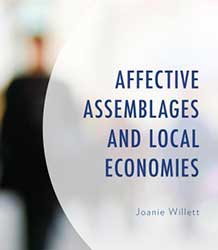articles

Joanie Willett, Affective Assemblages and Local Economies, Rowman and Littlefield, 2021
A book by Joanie Willett on Affective Assemblages and Local Economies
Joanie Willett, Affective Assemblages and Local Economies, Rowman and Littlefield, 2021
Whether we call it cohesion, levelling up, lagging regions, or place-based policy; regional inequality has been a long-term persistent problem. In the outset of the book I set out to explore what imagining the region as a complex adaptive assemblage has to offer our post-pandemic build-back, beginning with participant positionality. The case studies show examples where systems have been put in place in order to improve local economies, but that these systems are unable to work as intended because important connecting spaces have become overlooked.
I was really interested in how places adapt, and what we would find if we begin from the starting point of adaptation – particularly using the Deleuzian Assemblage and the complex adaptive system. The complex adaptive regional assemblage invites an analysis of regional policy which examines the ways that things, objects, ideas, people, the environment, and knowledges are connected. Focussing on exploring the spaces of possibility through which the region assemblage can successfully adapt.
In the book, I look at Cornwall in the SW of the UK, and the SW of Virginia in the USA. Both are rural regions which have experienced massive economic change in recent years. Although the regions and their assemblages that I explore will continue to adapt and develop one way or another, currently many people in these regions are being left out of this adaptation. As a consequence, existing inequalities become more deeply entrenched which risks building up resentments and frustration. This book shows that we need to begin looking at regional economies from different starting points, also exploring where vital connections are, or are not happening in order to be able to help regions to flourish. This is the lesson that we need to learn as we recover from the pandemic. We need to step outside of strategic, and development assemblages, and really explore and understand the assemblages within which the broader population live.
